Sara Tarrés, author of ‘I Don’t Like My Child’: ‘We are more likely to reject children who make us feel incompetent’
The psychologist recognizes that it is difficult for parents to admit they do not like their offspring. In order to repair the bond, the expert recommends admitting as much in a safe place, free from judgment and labels

Psychologist Sara Tarrés Corominas, 41, is a specialist in clinical child and adolescent psychology, as well as in learning difficulties both in school and within the family. She explains complex issues in a way that makes them easy to understand and has been at the helm of the Mamá Psicóloga Infantil blog for almost 11 years, advising on parenting and education and explaining the psychology behind her ideas. She does not shy away from expressing her opinion on edgy topics, such as why children might be disliked by their mother. “Although it may be hard to admit, the fact is that we can really dislike them,” Tarrés explains. “As people we relate to on a daily basis, they can trigger all kinds of emotions and thoughts, including discomfort and, in some cases, rejection.”
This topic was discussed with Tarrés in EL PAÍS’ Mamas & Papas section a year ago, leading to the writing and publication of her book, I Don’t Like My Child which is now in bookstores.
Question. Is the feeling of not liking your child more common than we might think?
Answer. Yes, it is, and perhaps far more so. Sometimes, this feeling is circumstantial, a product of a spike of anger. On the other hand, it can be more latent, more entrenched, in instances where the bond has been eroding over a long period of time.
Q. Why don’t people talk about it?
A. It is not easy to find a safe place where we are not judged. Recognizing the feeling publicly is complicated. And even more so if you are a woman, because we, as mothers, are judged for everything and even more so when we say we feel something for our sons and daughters that suggests we are far from the ideal of the self-sacrificing, patient, sweet and loving mother who never gets angry. It is as if we are not allowed to feel anything other than pleasure and well-being around our offspring. We are afraid and ashamed to say that a child annoys us. Fortunately, if we find a safe place, where there’s no judgment, or labels, or good and bad mother badges, we can repair the bond. One of the objectives of this book is to help break this taboo and flag up the fact that these “unpleasant” feelings and thoughts can emerge.
Q. Why might parents dislike their children?
A. There are multiple factors involved. And all of them have more to do with the adult than the child. Some of the reasons involve idealizing motherhood, believing everything we see in magazines, or on social networks or what we read in parenting books and manuals. It can also be about having unrealistic expectations of ourselves as parents and about how our children will turn out. Other factors include, living with a child, pre-teen or teenager who talks back all the time; dealing with children who have become endlessly demanding tyrants who don’t give anything in return; children who do not accept parental authority, who are constantly challenging and defiant, pushing their parents to the limit; or children who are a reflection of the “worst” of ourselves.

Q. Do the most difficult children tend to be the ones who are restless, argumentative, and disobedient?
A. We tend to feel less warm to children who make us feel incompetent as parents. And that can happen in many ways. For example, as you’ve said, with restless, argumentative, demanding children. With those with whom there is permanent conflict, with whom we have to invest a lot of emotional energy. But also, with those who reflect some of the darker sides of our personalities; in other words, parts of ourselves that we do not like. Or perhaps we struggle with those who remind us of someone we do not get along with. It is sometimes very diffuse, hence the importance of being able to talk about what we’re feeling in order to explore the root of the problem and so seek the appropriate solution. And that cannot be done if we keep silent or think that the problem is with the child.
Q. How do you deal with a child you don’t like but have to raise?
A. We have to be aware of what’s happening. We must try to get out of this vicious circle because it is very difficult to raise a healthy child in a climate of discomfort, rejection, aversion and antipathy. In some milder cases, it will be enough to make small changes such as having lower expectations and freeing ourselves from the need for perfection, but in many cases the solution lies in seeking professional help to try to repair the bond. If we fail to do so, we can become trapped in unhealthy relational dynamics with huge repercussions on the emotional development of our children.
Q. How do you build bridges for a healthy relationship with your child?
A. One way to do it is to switch our focus to the things our child does that are correct, adequate or less displeasing; to stop seeing mistakes and failures in everything they do; to focus on those aspects that we like the most and build them up; to realize that not everything about our child is as negative as we think. But, the great bridge between our children and ourselves is our ability to empathize with them. Because without empathy everything is more difficult. It generates discomfort. The child will feel misunderstood and invisible. Without the empathy of the other, they feel judged and sentenced to scoldings, sermons or punishments, for example.
Q. What if you have a favorite child and a not-so-favorite child. How do you get to have an equal relationship with both?
A. Studies have concluded that 65% of mothers and 65% of fathers show a preference for one of their children. In these situations it is important to look at the way we behave — if for example, we are being more condescending to one than the other, of if we are constantly comparing them. These preferences are usually temporary and change with time, and not openly manifested as we need to preserve the stability and well-being of the family. Because although feeling greater affinity with one of our children at any given moment is not in itself negative, we must try not to let it get out of hand and put the other siblings at a disadvantage. Feeling a greater affinity for one child does not have to translate into favoritism. It will depend to a great extent on what we do with this feeling and how we then behave towards each of them. When the preference is constant and permanent, it ends up being extremely harmful.
Sign up for our weekly newsletter to get more English-language news coverage from EL PAÍS USA Edition
Tu suscripción se está usando en otro dispositivo
¿Quieres añadir otro usuario a tu suscripción?
Si continúas leyendo en este dispositivo, no se podrá leer en el otro.
FlechaTu suscripción se está usando en otro dispositivo y solo puedes acceder a EL PAÍS desde un dispositivo a la vez.
Si quieres compartir tu cuenta, cambia tu suscripción a la modalidad Premium, así podrás añadir otro usuario. Cada uno accederá con su propia cuenta de email, lo que os permitirá personalizar vuestra experiencia en EL PAÍS.
¿Tienes una suscripción de empresa? Accede aquí para contratar más cuentas.
En el caso de no saber quién está usando tu cuenta, te recomendamos cambiar tu contraseña aquí.
Si decides continuar compartiendo tu cuenta, este mensaje se mostrará en tu dispositivo y en el de la otra persona que está usando tu cuenta de forma indefinida, afectando a tu experiencia de lectura. Puedes consultar aquí los términos y condiciones de la suscripción digital.








































